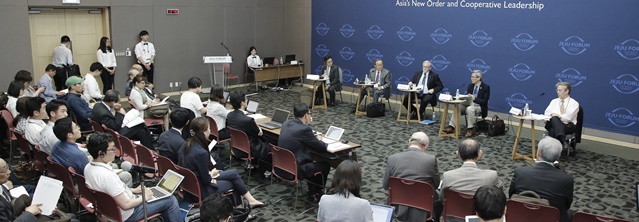[Newsletter Vol. 19] Sanctions-Negotiations-Confrontation: North Korean Nuke Crisis at Crossroads
2017-05-26 00:00:00

Sanctions-Negotiations-Confrontation: North Korean Nuke Crisis at Crossroads
Viable Alternatives Sought at 11 Jeju Forum Sessions on NK Nuke Issues
The North Korean nuclear arms issue, one of the major ones on international society’sagenda, will be addressed as a key subject of the Jeju Forum this year. Eleven out of 71 JejuForum sessions will form a “track of nuclear arms discussions” that will diagnose the threatsof nuclear weapons in the Asia-Pacific region and seek denuclearization of the area.The organizers of the sessions related to nuclear arms issues are the Asia-Pacific LeadershipNetwork (APLN), the East Asia Foundation, the Korea National Diplomatic Academy, the JejuPeace Institute and the Korea Foundation for Advanced Studies.The sessions will be attended by the high-level delegates on UN disarmament commissions,including India’s Center for Air Power Studies and the Defense Committee of the PakistaniSenate, which are parties directly involved in nuclear disarmament; the People’s LiberationArmy of China and the Chinese Academy of Social Sciences, which are expected to play a keyrole in resolving the North Korean nuclear issue; scholars from the Carnegie Endowment forInternational Peace; and other opinion leaders.The participants who will discuss viable alternatives to the nuclear issue are Des BROWNE, aformer British defense secretary who joined the Advisory Group of the ComprehensiveNuclear-Test-Ban Treaty (CTBT); KIM Won-soo, a former UN under-secretary general fordisarmament; Nobuyasu ABE, a former UN under-secretary general for disarmament; SHAZukang, a former UN under-secretary general for economic & social affairs; NYAMOSORTuya, a former foreign minister of Mongolia; JIA Qingguo, dean of the School ofInternational Studies, Peking University; and KIM Sung-hwan, a former minister of foreignand trade affairs of South Korea.The discussions are divided into three subjects: non-nuclear proliferation, nucleardisarmament and nuclear security. The discussions on measures to check nuclear proliferation by other countries than the five nuclear powers are scheduled for the sessions organized by the APLN under the following titles:-No First Use and the Asia-Pacific (at 1 p.m. on May 31)-Containing Nuclear Rivalries in Asia: What Roles for the Non-Nuclear Weapons State? (at2:50 p.m. on May 31)-The NPT: Challenges for the 2020 Review (at 4:40 p.m. on May 31)-Denuclearizing the Korean Peninsula: Making a Breakthrough (at 1 p.m. on June 1)-North Korea Policies of Current Neighboring Countries: Donald Trump, Xi Jinping, Abe Shinzo and the Korean Government (at 2:50 p.m. on June 1)-Denuclearizing North Korea under a New Security Environment in Northeast Asia (at 2:50p.m. on June 1)The APLN is an expert group organized to form a consensus among high level policymakerson the need to curb, reduce and ultimately remove nuclear arms by informing them of thereal and serious threats of nuclear armament. Members include former and incumbent highlevel political and military officials from 14 countries, and 60 opinion leaders. Key members ofthe APLN are such dignitaries as Kevin Rudd, a former Australian prime minister; GeoffreyPalmer, a former New Zealand prime minister; Kono Yohei, a former Japanese foreignminister; and prominent scholars, including Prof. Shen Dingli at Fudan University in China.Korean members of the APLN are former Prime Minister Lee Hong-koo, Korean PeninsulaFuture Forum Chairman Chun Yung-woo and Jeju Special Self-governing Province GovernorWon Hee-ryong.The sessions organized by the Korea National Diplomatic Academy under the title, “NorthKorea Policies of Current Neighboring Countries: Donald Trump, Xi Jinping, Abe Shinzo andthe Korean Government” (at 1 p.m. on May 31) and “Denuclearizing North Korea under aNew Security Environment in Northeast Asia” (at 10:20 a.m. on June 2) will also address theNorth Korean nuclear issue.The discussions at the sessions above will be focused on the security environment of theKorean peninsula now at a crossroads. The sessions will examine the implications of theprinciple of no first use of nuclear weapons amid North Korea’s continual nucleardevelopment, and illuminate the roles of non-nuclear states in preventing the domino effectsof nuclearization and reducing nuclear threats in the Asian region.The APLN and the experts in global nuclear governance from the countries involved in theNorth Korean nuclear issue – China, the U.S., Russia and South Korea – are expected tosuggest practical policies to resolve the nuclear issues.
